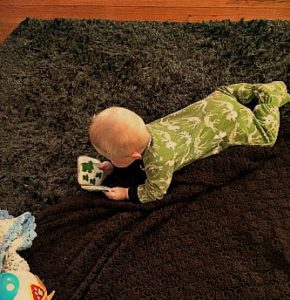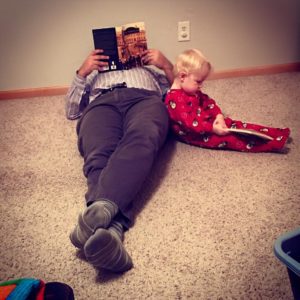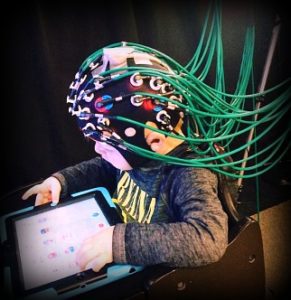Most kids get along with their age peers and are a bit above average. Those kids do well in school and tend to make friends with other kids their age. Then there are the kids who are more intense, more sensitive, more detailed, more everything.
These are the precocious ones.
They rarely sit still, and won’t pay attention to anything they don’t want to or think they already know. Keeping them stimulated and engaged is an exhausting, futile endeavor. Often, they need less sleep, more physical activity, and demand consistency and perfection from themselves and others. They are acutely perceptive; they notice if a toy is moved, a light bulb is out, a tag doesn’t feel right on their clothes, furniture was rearranged, a fan was left on upstairs, ad nauseum. These offenses are minor to most people, but can consume these kids.
On the playground, being a parent of this type of kiddo can be isolating. People tend to jump to several common assumptions, accusing the parent of lying about the child’s age, using “drill-and-kill” teaching strategies, coaching them, pushing them, bragging, etc.
I know this because I’m living it.
I’ve gotten the snarky comments and been told I’m “lucky” he’s so smart. No, I’m not “lucky.” It doesn’t make parenting easier; in fact, it’s a huge responsibility and my husband and I liken our lives to The Red Queen. I almost always feel inept, and as if I’ve been cheated out of milestones I wanted to cherish. I looked forward to reading to my son, but he has never let me. As an infant, he’d cry and squirm away when I tried to read to him. As a toddler, he flat-out refuses. He will leave the room, push the book away, or tell me to stop. This isn’t to say he doesn’t like books, he loves “reading” books on his own and when I read my own books out loud (as long as he can do something else simultaneously).

I didn’t realize that once he’s mastered something, he willfully defies repetition. He hasn’t wanted to hear about the alphabet, colors, or shapes since he was 15 months old. He’s onto playing cashier/chef/baker/grocer and learning parts of the car in detail. As his main source of information, I must know the answer or else he will have a meltdown.

Socially, he doesn’t know what to do with kids his own age.
Though he tries, he just requires more novelty and stimulation than others, which complicates matters. I cannot sit him in front of the TV while I take 15-30 minutes to finish something. I can’t just tell him “No,” or “Stop,” because he also demands a reason. He will not respond to reprimands or do anything I ask without reason. Once he knows why, then he readily complies, and I almost never have to tell him again.
While my 26-month-old is functioning at a 3- or 4-year-old level cognitively, his language is barely on par for his age. His gross motor is way above average, but his fine motor is lagging. This is a two-year-old that has little interest in age-appropriate toys and would rather play with circuitry, cook, and study how things work. He favors deconstruction and ingenuity over stacking blocks, superheroes, and being read to.
As his mother, I will not ask him to downplay his abilities for other people’s comfort, push him into anything he hates, tell him what to like/dislike, love him any differently, or change the expectations I have for him as a person.
The morning he woke up before me, I came downstairs to find he’d plugged in the Keurig and was making me coffee. He had my favorite mug, filled the hopper with water, turned it on, put the K-cup in, shut the lid and hit start when I came flying down the stairs. To this day, I still have no idea when he ever learned the sequence of making coffee, and I’d never let him experiment with it (he never seemed aware or interested). I was terrified; he was proud. He was just 18 months. This leads to my next issue of parenting a kid that is precocious – safety!
Childproofing has failed impressively.
From the time he started pulling to stand, he’s thwarted almost all of our attempts. I’ve had the locks on the cabinets switched out, moved things up and away, padded corners, changed outlet covers 4 or 5 times, removed batteries, locked doors, put up baby gates, installed chain locks, and moved things around. He learned how to pick an indoor lock last month – not sure how, but…SURPRISE! He somehow knew that batteries ran things and needed occasional replacement. If needed, he’d bring the (usually) correct tool, the batteries, and the offending remote/toy. That level of understanding before he has the language to speak about his frustrations is a huge challenge for all of us involved.
I’ve had several “mom fails” resulting in neighbors bringing him home after he’s escaped the house, scarring me for life and giving me anxiety about DHS showing up. Two months ago he figured out that going into our attached garage, getting into the car, and hitting the garage door opener will be his newest exit strategy. We put a chain lock on the other doors, since he used to unlock those and run out while I was in the shower.
Our attempts to stay one step ahead haven’t worked.
Our most recent plan of attack is to NEVER, EVER let him out of our sight. Sleeping-in or showering alone can NOT happen. I can’t really be upset at him. He genuinely wants to explore and is proud of his independence and abilities, even though I want to shake him for some of the the stunts he pulls. His dad, nana, nanny, and I frequently have chats about his newest little quirks and tricks to be aware of. They are always changing, adapting, wising-up.
I’m certainly not “lucky” that our Griffin has serial obsessions/fixations, a rigid (almost OCD) sense of how things need to be, issues with sensory processing, a need to perfect whatever he’s doing or master what he wants to learn before he can move on, an astute sense of right and wrong (eg. making us apologize for cuss words, backseat driving, trading), an ironic and sarcastic sense of humor, and a relentless drive for novelty.
In an almost pathetic sense, Ross and I feel like we are just a means to an end for Griffin, not the idolized parents he looks to for courage or solace.
Because he is seemingly so self-sufficient, Ross and I perceive our roles less as parents and more like flies on the wall who intervene when necessary. When he wants to go to bed, he shoos us out of the room and puts himself to sleep, telling us the routine he’d like that night as we go. He requests for us to leave when he wants privacy, picks out his clothes, tells us when he is done playing or wants to go home. He cleans his room, puts away his toys and clothes, throws away his garbage, even puts all the shoes away in the closet (daddy can never remember) –none of which we have ever asked of him.
We encourage him to be a kid and he insists on being structured, disciplined, and independent.

Yes, I’ve had professionals weigh in. His fMRI and EEG showed us that it takes him just one exposure to create a working memory. As his mother, I will not ask him to downplay his abilities for other people’s comfort, push him into anything he hates, tell him what to like/dislike, love him any differently, or change the expectations I have for him as a person.
The next time you’re talking to a parent and taken aback by a kid’s age or abilities, please avoid assumptions about our parenting. We brought our kid to the playground to have fun, make friends, get out of the house, and just be a kid. Ross and I know there was nothing we did or didn’t do to make him this way–it’s just how and who he is. Our assumptions are that you love your kid, and you’re just as tired, overwhelmed, and doing the best that you can, too!
If your feel that your child is quite different from his or her peers, trust your instincts and talk to your child’s pediatrician and teacher. They can help you as you seek to understand and support your child’s growth and development.











We are lucky to have a great resource for precocious kids and their parents here in Iowa City: the Belin-Blank Center for Gifted Education and Talent Development. They have an Assessment and Counseling Clinic (which can be very helpful in guiding parents), research and resources for parents and teachers, and extracurricular academic programs for school-aged kids. Very few cities have a gifted education center, so we are lucky here!
Thanks Kristin! We are so lucky!!